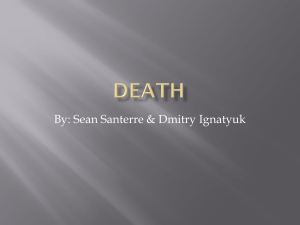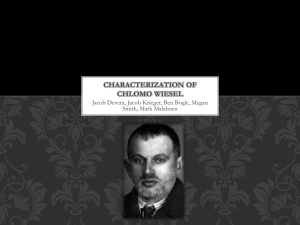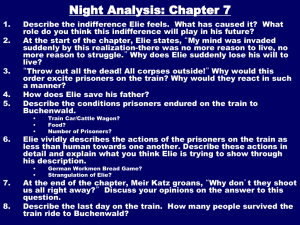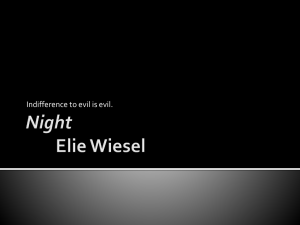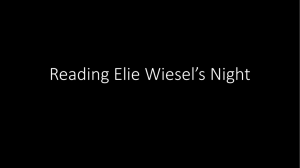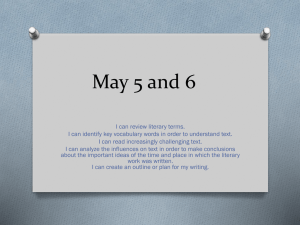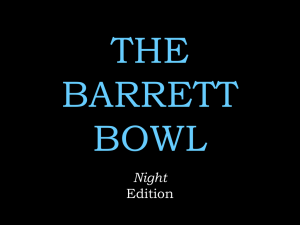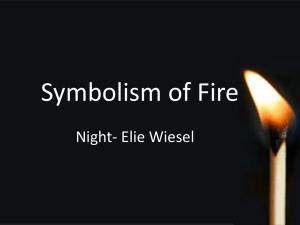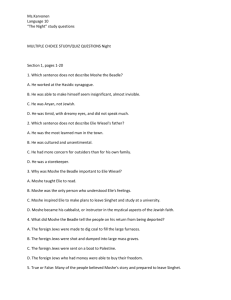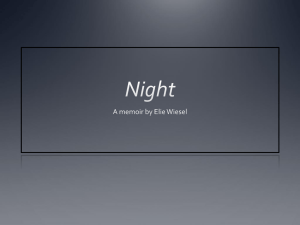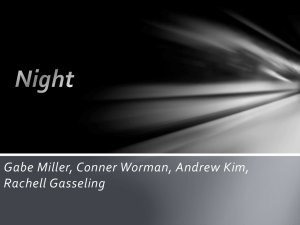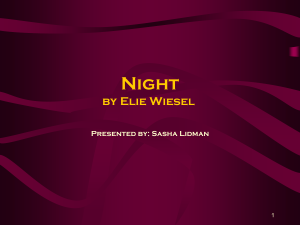Night - blufirestar29
advertisement
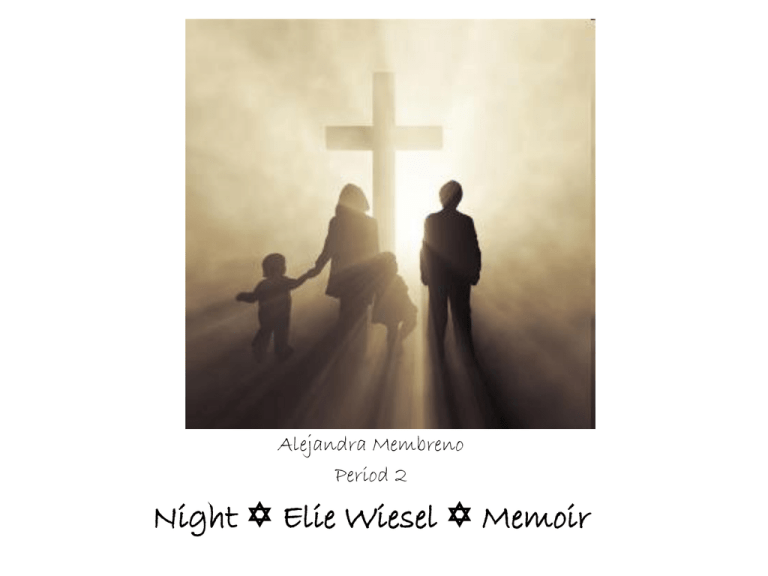
Alejandra Membreno Period 2 Night Elie Wiesel Memoir Literary Elements Irony Foreshadowing -“I learned after the war the fate of those who had stayed behind inn the hospital. They were quite simply liberated.” Pg. 55 -“It was as though she were possessed by an evil spirit which spoke from the depths of her being.” Pg. 16 -“Jews, listen to me! I can see a fire! There are huge flames! It is a furnace!” Pg. 16 -“…I have been saved miraculously. I managed to get back here. Where did I get the strength from? I wanted to come back to Sighet to tell you the story of my death. So that you could prepare yourselves wile there was still time.” Pg. 4 Metaphor -“He paid us about as much attention as a dealer might who was just receiving a delivery of old rags.” Pg. 33 -“We’re on the threshold of death…Soon we shall have crossed over.” Pg.23 Simile -“A man appeared, crawling like a worm in the direction of the cauldrons.” Pg. 39 -“The antechamber of Hell must look like this.” Pg 23 Imagery -“Meir Katz, a giant had a child’s trousers, and Stern, a thin little chap, a tunic which completely swamped him.” Pg. 24 -“Perhaps it was because of the thick smoke which poisoned the air and took one by the throat…” Pg. 24 Literary Elements Cont. Internal Conflict Indifference -“Why should I bless His name? The Eternal, Lord of the Universe, the All-Powerful and Terrible, was silent.” Pg. 22 -“I gave him what was left of my soup. But it was with a heavy heart. I felt that I was giving it up against my will. No better than Rabbi Eliahou’s son had I withstood the test.” Pg. 72 -“He leapt on me, like a wild animal, hitting me in the chest, on the head, throwing me down and pulling me up again, his blows growing more and more violent I was covered with blood.” Pg. 35 -“They didn’t give us anything…they said that if we were ill we should die soon anyway and I would be a pity to waste the food. I can’t go on anymore…” Pg. 72 Characterization -“The student of the Talmud, the child that I was, had been consumed in the flames. There remained only a shape that looked like me.” Pg. 24 -“A tall man, about thirty, with crime in scribed upon his brow and in the pupils of his eyes.” Pg. 25 Plot -“Never should I forget that night, the first camp, which has turned my life into one long night, seven times cursed and seven times sealed…” Pg. 22 -“Why should I bless His name?” Pg. 22 Theme Analysis Elie was told no one could think of anyone else, even their father-Pg.74 Chlomo was slapped and fell to the ground but Elie didn’t do anything-Pg.26 Rabbi Eliahou’s son leaves his father during the run-Pg.61 Self Preservation vs. Family Commitment Meir kills his father for a small piece of bread-Pg.68 Madame Schachter was tied up and silenced, and her son just watched-Pg.16 Theme Analysis 1. Elie Wiesel uses Self Preservation vs. Family Commitment a lot through Night. He shows how hard it was for him and many other people to stay loyal to their families in such harsh conditions. He gives examples of sons betraying their fathers. Elie is very surprised when he is able to figure out that Rabbi Eliahou’s son left him for dead. He is troubled later on when a woman throws money into a pit and sees children fighting over it but keeps throwing more in. This was a difficult way for Elie to learn how he should treat his father. In the train ride to Birkenau, Elie witnesses what he would later be doing in the story. Madame Schachter is beaten and tied up to be silenced and her son does nothing to stop the men from hurting his mother. Once at Buna Elie Wiesel’s father, Chlomo is slapped across the face by Idek so hard that he falls to the ground. Elie does nothing in return and he isn’t sure why. His father is able to see that Elie feels bad so he reassures him that it does not hurt. 2. Elie Wiesel uses many literary elements throughout Night. He uses them to express his feelings and show the reader what he saw. To me, Elie Wiesel’s use of imagery was too little. He should have used more to really give the reader an idea of what it was like to live in a concentration camp. Internal & External Conflict Elie questions his belief in God Elie sees everything going on and wonders why God is letting it all happen Elie tries not to betray his father Elie has to fight his will so he doesn't do what Rabbi Eliahou’s son did Elie did not want to loose his gold tooth Elie’s gold tooth was taken from him, he wanted to save it for something important Elie was whipped Elie saw Idek with a girl and he was punished for it Motif • Night Night time is important to Night because many altering moments happened during this time. Elie Wiesel uses night because he was tortured at that time. He feels in the dark during the Holocaust. -”Night fell. There were twenty people gathered in our back yard. My father was telling them anecdotes and expounding his own views on the situation” Pg. 7 Elie says this before his father finds out about the ghetto. -”An icy wind blew in violent gusts. But we marched without faltering.” Pg. 57 They ran all through the night barley escaping death because of the freezing temperature. -“Total silence throughout the camp. On the horizon the sun was setting.” Pg. 42 While the sun was setting two adults and one child were hanged. • Eyes Eyes are important in Night as well because they express so much about a person. Wiesel uses them to describe how people seem to him in his opinion. Eyes are the window to a person’s soul. -“…with crime inscribed upon his brow and in the pupils of his eyes.” Pg. 25 Elie can tell that the man is evil and does not care for them. -“One of his assistants--a hard-faced boy, with hooligan’s eyes…” Pg. 31 Without even talking to the boy Elie thought he was trouble and he was right. -“…Facing me was a very beautiful woman with black hair and dreamy eyes. I had seen those eyes before somewhere.” Pg. 35 Elie was able to remember the girl ho had helped him in Buna in 1944. Who Is Responsible? Red Blue 10% 5% 5% Green 5% Yellow 10% 29% Orange Purple 10% Brown 5% 1% 20% White Pink Black Hitler is most responsible for the Holocaust because he is the one who ordered for it to happen; but he is not the only guilty one. The German citizens who voted for him have a lot to do with the Holocaust as well. They were the ones who voted and gave Hitler his power. Churches and people around the concentration camps should also feel a sense of guilt because they knew what was happening but they didn’t do anything. God has reason’s for all of his doings. The Holocaust has taught many people about indifference and how wrong it is. Lastly, the Jews were the victims of the Holocaust; they were struck with terror and couldn’t do anything about it. If they tried o escape they would have died, and if they didn’t they still had a great chance of dying. Key 1. Sighet 2. Birkenau 6. 3. Auschwitz 4. Buna 5. Gleiwitz 5. 2. 3. 4. 6. Buchemwald 1.
